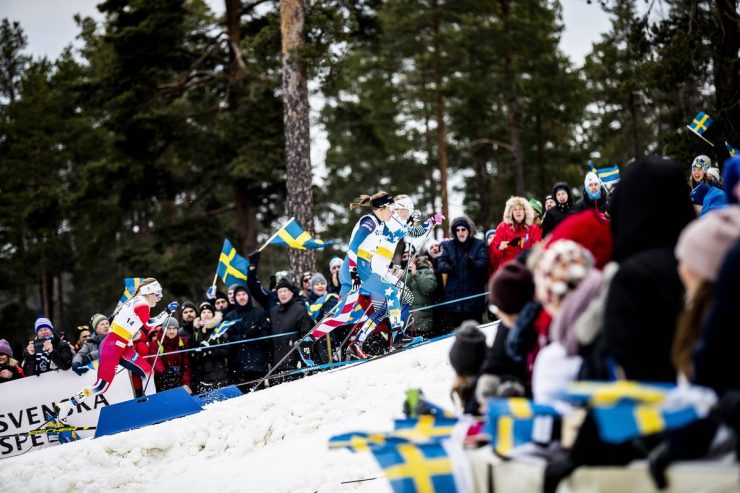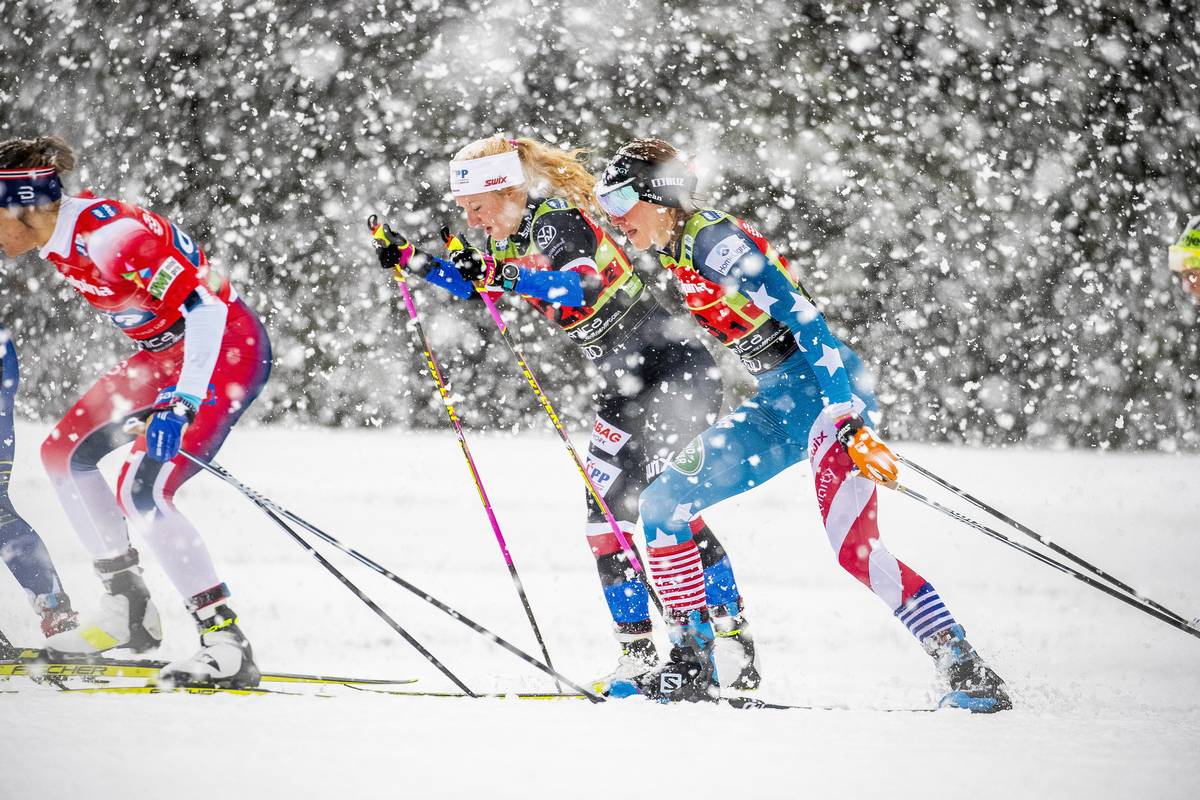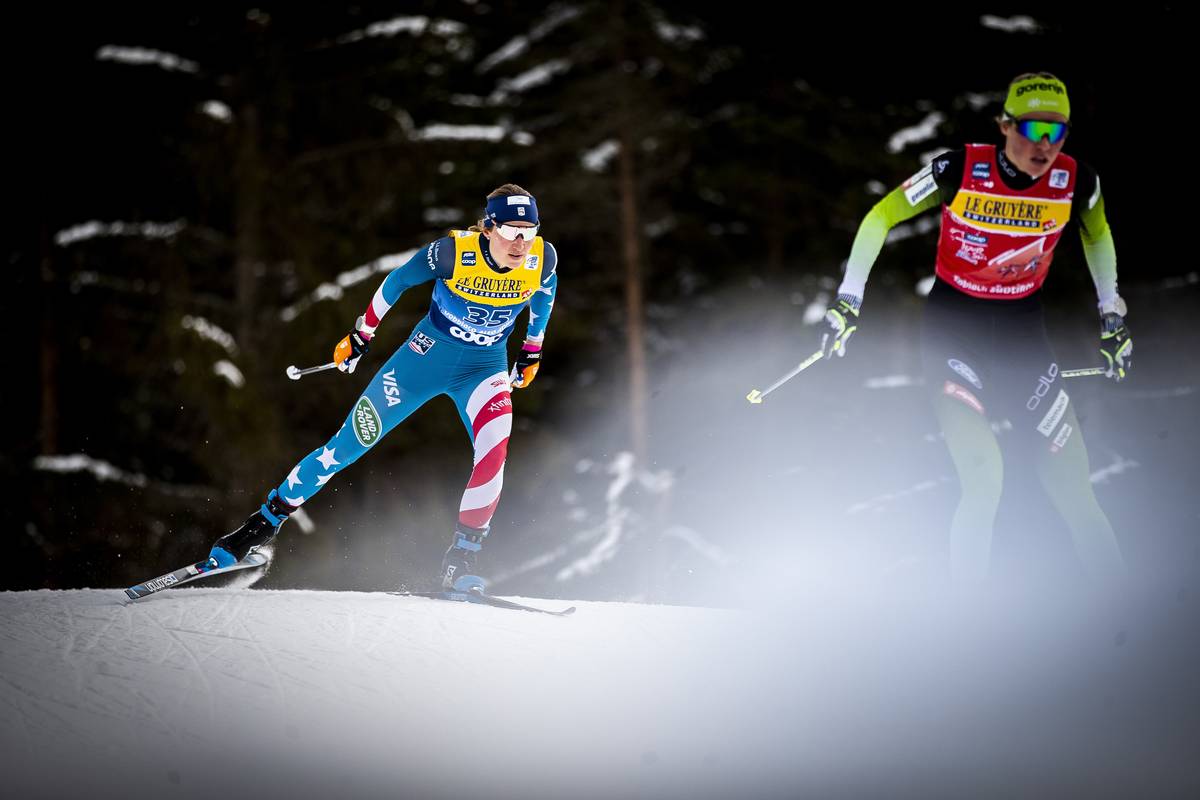
Perhaps, by the time you read this, Sophie Caldwell will have already sped her way around the sprint circuit in Ruka, Finland. The World Cup begins on Friday. At once Caldwell possesses a down-to-earth humility and a killer’s instinct to find the gaps and repeatedly progress through World Cup sprint heats. Off the course, she’s more likely to ask about your day than she is to dwell on a World Cup podium.
We caught up with Caldwell for this interview while she was still in Vermont, prior to her departure for Finland on November 18.
***
FasterSkier: I think Vermont received some early season snow. Have you been able to get out and ski a bit?
Sophie Caldwell: There’s actually this dirt road, just kind of past my parent’s house. It’s a little higher elevation, we have been doing some limited early season skiing there, but it’s kind of just back and forth on that road. It’s not good skiing, but at this time of year, it’s exciting just to have it. So we just kind of tromp around on it. But there’s no tolerance for complaining about bad skiing, right?
FasterSkier: Correct, that is a good rule of thumb. Generally, how was your off season?
SC: Simi and I have been living with my dad this summer, which has been really nice for all of us. And my dad has been busy. He did a ton of gardening in the summer which I think is awesome. I feel like we didn’t have to buy any vegetables at the grocery store because his garden was doing so well.
FasterSkier: The pandemic has been ruling all. What has your experience been?
SC: I guess the pandemic kind of impacted the basic training that I would normally undergo as an elite athlete. But starting early summer, we didn’t have any of our usual camps. And that’s been our chance to get on snow, late spring, early summer. And so that was the first big change. And then all the camps were canceled throughout the summer. So I’d say that’s been the biggest change is not having any national team camps.
And it’s tricky, because a lot of our team is in Vermont, and a lot of our team is in Alaska. So national team camps are the one thing that brings us together to meet in the middle. We haven’t seen a lot of our teammates since we left the World Cup in February or March. But, really, I feel very lucky to have such a strong club team here in Stratton. We’ve been training as a group, we’ve more or less been kind of a pod all summer.
And if we know if someone leaves the state or travels or we’re exposed to anything, that person would come back and either quarantine for a week and get a test or quarantine for two weeks before resuming train.
I feel like everyone’s been very respectful of those rules. And as a result, it’s worked quite well. And we’ve been able to stay healthy and put in some really good training back here. Even though I’ve missed the national team camps, it’s actually been really nice to get into a good training routine in Southern Vermont, and in a way, be a bit of a Vermont tourist. I feel like we’re exploring more of our backyard, and maybe going up to Northern Vermont a little more. So we’ve been staying closer to home, but still getting out for some adventures, which has been fun.
FasterSkier: How did the vibe change from say the first couple months of the pandemic where it was seemingly like, and I’m just projecting here, “Oh, my gosh, don’t go near other people or don’t do this.” Then, of course, we knew to mask-up and wash-up. Then we became more familiar with how the virus is transmitted, and how it appears to correlate to the duration of exposure. I’m just kind of curious, how did that look for the first month or two for you, and how did that change as we began to better understand this from a scientific perspective?
SC: You know, I think in the beginning, it was pretty terrifying because we didn’t know how to protect ourselves. We didn’t know how to protect the ones we love or maybe those higher risk among us, we didn’t know how you got it really, or how you got sick.
There were just so many unknowns. And while they’re still some for sure, some unknowns, I feel like, we better know how to protect ourselves. I think that’s been the biggest change. And I’m not scared of going to the grocery store now. because I am wearing my mask. Everyone else is wearing their mask, I sanitize my hands as soon as I get back to my car, and just these little things that I know if I wear my mask and wash my hands they help.
And I’m not sticking my fingers in my eyes and my mouth all the time. I’m doing a pretty good job of protecting myself. So I think that’s been helpful.
I guess the change for me has mostly been, the virus hasn’t gone away. But we’ve learned to live with it and how to protect ourselves the best we can. And in the beginning, I think there were just so many unknowns that it seemed the only safe thing to do was to lock yourself in your house and never leave.
Now, it’s nice, because we’re still not doing indoor gatherings or anything, but you can at least get out a little more and return to a small sense of normalcy.
Although this is kind of becoming the new normal, I guess. I have to say it’s sadly normal.
FasterSkier: I am curious, when I look at the world map and the national map right now, there’s a lot of red. I’m referring to high transmission rates for COVID. I know you plan on heading over for Period I on the World Cup. What is that going to look like for you? How are you wrapping your brain around all this?
SC: I feel like it still hasn’t really sunk in. I mean, there’s still just so many unknowns and things change so much each day that I think the key is going to be being able to be flexible, going with the flow. But right now our plan is to fly over a week from today on the 18th.
Our first stop is Finland. And Finland is actually doing remarkably well compared to Europe and to the rest of the world. And so I do feel okay about that. And as far as I know, they’re planning on holding those races.
And then it gets really tricky because then we’re down in Central Europe. Pretty much everywhere in Europe is in the red, Sweden and all of Central Europe. And so, yeah, I don’t know, I don’t know what’s going to happen. I think we go over there with the mindset that we could have a full season. But I just don’t know what’s going to happen after those first two weeks, because a lot of those countries are as bad or worse than even us right now.
Which, when you think about it, is pretty crazy. I really don’t know how much the country or national government itself has to do with holding races, you know, but we could run into the problem like we did in Québec last year where no one really wants to cancel. I think those local organizing committees and communities lose a lot of money.
But my hope is that if we are racing, we can do it in a responsible way that provides entertainment for everyone. Back home we have pretty strict COVID protocols, we’re all gonna do our best to be always wearing our masks and washing our hands and not interacting with any of the other athletes. On the World Cup we’ll probably have the same roommates for a whole period on the World Cup, if not the whole season.

FasterSkier: Outside of this, I don’t consume a ton of sports, to be honest. You know, I just get enough doing what I’m doing. I know some people who cover sports discuss openly that they are flummoxed they are even speaking of sports at all. I’m bringing this up because you mentioned the idea of entertainment. I mean, you are right, at the end of the day, I guess some people see sport as entertainment. I’m just curious, how have you worked through that, to say I’m a professional athlete and I have a job to do?
SC: I think this also provides people like me and people who like to watch the sport, a sense of normalcy. They get to see and know that people are going about their business and preparing to race.
My feelings about it go back and forth a lot. I’m often pretty torn because, I mean, like you said, right now it sometimes seems so crazy to be thinking about sports and thinking about training. But, you know, if we are able to pull this off somehow, and do it safely, that can be a positive.
I understand we can’t really have a bubble, like some of the other major sports. It’s hard because we’re going from country to country, but hopefully, the cross-country World Cup isn’t going to be a super spreader event. Hopefully, it’s not a huge risk and I do think if we can have even just a few races to provide some entertainment for people back home and for families to provide a sense of normalcy, that can be a positive. I do think there’s that mental aspect for we, to think that maybe our racing circuit could be helping out. But I know that is a hard line to draw when considering all that is going on. Like when is it worth it and when is it not worth it?
But yeah, I go back and forth on it. It’s tricky. But, hopefully, we can do it and make it interesting.
FasterSkier: Have you set your own guidelines when it comes to COVID? Like, if this is going on and that is going on then you tell yourself that you’re out? For you personally, what will you consider a situation where you pull the plug? I’m just curious if you have thought about what your own limits are?
SC: Yeah, I guess I haven’t set any hard limits but I think if I feel they are not following the guidelines they agreed to, or races aren’t being held safely, I would have no problem saying I’m not comfortable with this and I’m out of here. My hope is that their guidelines are very strict and their standards are very high and of course everyone is expected to follow them.
I guess it’s not like ‘oh if I see this one particular thing I’m gone’. It’s just sort of a general feeling of safety and security and if it becomes super uncomfortable at any point, then no, I don’t think it’s worth it to continue on.
FasterSkier: Are you planning on coming back to Vermont at all during the season? Let’s assume a best-case scenario with COVID — Are you just going to stay for the duration in Europe through World Champs?
SC: The original plan A would be to stay till the end of the season. But considering other scenarios, then it gets tricky because if they start canceling things and they cancel things far enough in advance, then I think we’d come home. But you know, there’s a chance that maybe they would cancel things a week at a time.
That makes it really hard for North Americans because we’re just kind of stuck over there playing the waiting game. I guess we’ll navigate that as we get to it. But plan A would be to stay over in Europe for the whole season.
FasterSkier: From a training perspective, do you feel good?
SC: It’s been nice to just get in some consistent training back here. We have one more week and we’re doing an intensity block with some time trails this weekend. So I guess the idea is to try to sharpen this weekend then cut it back next week until races get started.
FasterSkier: The softball question, what are the season’s goals?
SC: The personal goals, the focus has always been World Champs but I’ll be focusing on every sprint and I think this season, in particular, it’s important just to show up all-in for every weekend because you never know when it’s going to get cut short. You never know how many races we’re going to have. I think it’s a little more important to show up sharp rather than really try to work into the season this year. So hopefully I can do that.
FasterSkier: Okay, you’ve been married a year. All things considered, life is good. Do you feel like you have much to prove from a ski career standpoint?
SC: My approach to ski racing and my ski career is pretty different from what it was when I was 20, just starting out on the team. But I would say, you know, I think we’re definitely nearing the end of our ski careers. It’s been really nice for me to end these last couple of years and really feel like I’ve found a sustainable ski-life balance. I think that’s helped both my skiing and my life outside of skiing. So maybe being married was part of that, but it is nice because it makes me feel like I’m a real person and taking these real steps in life.
So I think in that sense, I think my mindset towards skiing is different than it was when I was 23. And it doesn’t mean that I’m any less fired up. It’s just that I’ve kind of found a nice balance and found a good healthy way and scheme to fit it into my life.

Jason Albert
Jason lives in Bend, Ore., and can often be seen chasing his two boys around town. He’s a self-proclaimed audio geek. That all started back in the early 1990s when he convinced a naive public radio editor he should report a story from Alaska’s, Ruth Gorge. Now, Jason’s common companion is his field-recording gear.



